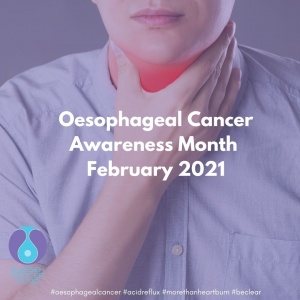 The Sussex Cancer Fund would like to help raise awareness of Oesophageal Cancer which is a difficult disease to treat but where nearly 60% of the cases could be prevented if spotted and treated early enough.
The Sussex Cancer Fund would like to help raise awareness of Oesophageal Cancer which is a difficult disease to treat but where nearly 60% of the cases could be prevented if spotted and treated early enough.
According to Action Against Heartburn “around 8,700 are diagnosed with Oesophageal Cancer each year in the UK, and around 7,700 die from it. About 70% of the cases are oesophageal adenocarcinoma.
The UK has the highest rate of OAC in the world, and it has been rising eightfold in the last three decades. OAC is associated with Barrett’s Oesophagus that is caused by long term reflux, and persistent heartburn.
If we can promote the diagnosis and monitoring of Barrett’s Oesophagus it is much more likely that people will be able to have this condition treated (for instance with radio frequency ablation) before it can develop into cancer, or, if they do develop cancer, they will be diagnosed at an early stage when the outcomes are much better.”
The Charity Guts UK’s says: “Oesophageal cancer is the sixth most common cause of cancer death in the UK. The oesophagus is the food pipe that leads from the throat to the stomach, where the body generates strong acid as a natural part of a healthy digestive system. But when the acid rises up past the diaphragm, something known as reflux, the lining of the oesophagus cannot cope with the acid, and can result in chest pain known as heartburn. Heartburn is very common and affects up to 25% of UK adults.
Heartburn is a common problem that occurs after eating, lying down or bending over and is usually described as a ‘burning’ sensation. If it lasts more than three weeks or persists when avoiding trigger foods/making lifestyle changes or food gets stuck when you swallow, you should see your GP to discuss further.
Around 10% of persistent heartburn sufferers who have longstanding reflux problems may develop a condition called Barrett’s Oesophagus where the cells in the oesophagus start to change colour, which can lead to dysplasia (a precursor to cancer). This can be treated to prevent cancer occurring. 59% of oesophageal cancer cases are preventable.”
“The incidence of oesophageal cancer is increasing and unfortunately the majority of patients are at an incurable stage by the time they first see a hospital specialist.
It is therefore vital that we detect this cancer at the earliest opportunity in order to give patients the best possible outcomes.
We are extremely grateful to the Sussex Cancer Fund for their support in working with us to raise awareness of oesophageal cancer.”
Mr Shameen Jaunoo BSc(Hons) MBBS ChM FRCS MFSTEd, Consultant Oesophagogastric Surgeon
Persistent heartburn is not normal, and whilst many over-the-counter medicines are excellent, they can have the effect of masking underlying causes. If you have any of the symptoms below please contact your GP
Main symptoms of oesophageal cancer
There are many possible symptoms of oesophageal cancer, but they might be hard to spot.
They can affect your digestion, such as:
- having problems swallowing (dysphagia)
- feeling or being sick
- heartburn or acid reflux
- symptoms of indigestion, such as burping a lot
Other symptoms include:
- a cough that is not getting better
- a hoarse voice
- loss of appetite or losing weight without trying to
- feeling tired or having no energy
- pain in your throat or the middle of your chest, especially when swallowing

 “The incidence of oesophageal cancer is increasing and unfortunately the majority of patients are at an incurable stage by the time they first see a hospital specialist.
“The incidence of oesophageal cancer is increasing and unfortunately the majority of patients are at an incurable stage by the time they first see a hospital specialist. 